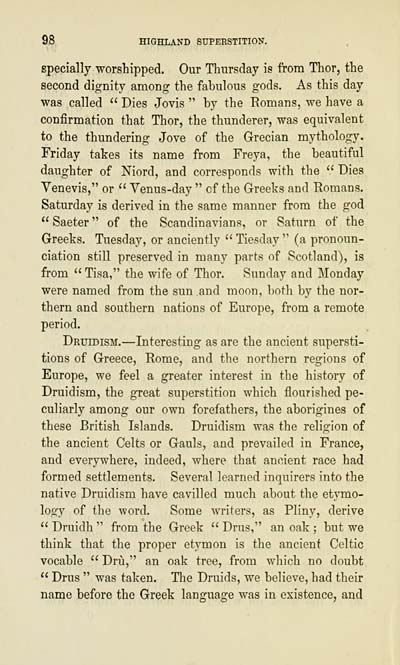Download files
Complete book:
Individual page:
Thumbnail gallery: Grid view | List view

98 HIGHLAND SUPERSTITION.
specially worshipped. Our Thursday is from Thor, the
second dignity among the fabulous gods. As this day
was called " Dies Jovis " by the Romans, we have a
confirmation that Thor, the thunderer, was equivalent
to the thundering Jove of the Grecian mythology.
Friday takes its name from Freya, the beautiful
daughter of Niord, and corresponds with the " Dies
Venevis," or " Venus-day " cf the Greeks and Romans.
Saturday is derived in the same manner from the god
" Saeter " of the Scandinavians, or Saturn of the
Greeks. Tuesday, or anciently " Tiesday " (a pronoun-
ciation still preserved in many parts of Scotland), is
from " Tisa," the wife of Thor. Sunday and Monday
were named from the sun and moon, both by the nor-
thern and southern nations of Europe, from a remote
period.
Druidism. — Interesting as are the ancient supersti-
tions of Greece, Rome, and the northern regions of
Europe, we feel a greater interest in the history of
Druidism, the great superstition which flourished pe-
culiarly among our own forefathers, the aborigines of
these British Islands. Druidism was the religion of
the ancient Celts or Gauls, and prevailed in France,
and everywhere, indeed, where that ancient race had
formed settlements. Several learned inquirers into the
native Druidism have cavilled much about the etymo-
logy of the word. Some writers, as Pliny, derive
" Druidh " from the Greek " Drus," an oak ; but we
think that the proper etymon is the ancient Celtic
vocable " Dru," an oak tree, from which no doubt
" Drus " was taken. Tlie Druids, we believe, had their
name before the Greek language was in existence, and
specially worshipped. Our Thursday is from Thor, the
second dignity among the fabulous gods. As this day
was called " Dies Jovis " by the Romans, we have a
confirmation that Thor, the thunderer, was equivalent
to the thundering Jove of the Grecian mythology.
Friday takes its name from Freya, the beautiful
daughter of Niord, and corresponds with the " Dies
Venevis," or " Venus-day " cf the Greeks and Romans.
Saturday is derived in the same manner from the god
" Saeter " of the Scandinavians, or Saturn of the
Greeks. Tuesday, or anciently " Tiesday " (a pronoun-
ciation still preserved in many parts of Scotland), is
from " Tisa," the wife of Thor. Sunday and Monday
were named from the sun and moon, both by the nor-
thern and southern nations of Europe, from a remote
period.
Druidism. — Interesting as are the ancient supersti-
tions of Greece, Rome, and the northern regions of
Europe, we feel a greater interest in the history of
Druidism, the great superstition which flourished pe-
culiarly among our own forefathers, the aborigines of
these British Islands. Druidism was the religion of
the ancient Celts or Gauls, and prevailed in France,
and everywhere, indeed, where that ancient race had
formed settlements. Several learned inquirers into the
native Druidism have cavilled much about the etymo-
logy of the word. Some writers, as Pliny, derive
" Druidh " from the Greek " Drus," an oak ; but we
think that the proper etymon is the ancient Celtic
vocable " Dru," an oak tree, from which no doubt
" Drus " was taken. Tlie Druids, we believe, had their
name before the Greek language was in existence, and
Set display mode to: Large image | Transcription
Images and transcriptions on this page, including medium image downloads, may be used under the Creative Commons Attribution 4.0 International Licence unless otherwise stated. ![]()
| Early Gaelic Book Collections > J. F. Campbell Collection > Prophecies of the Brahan seer (Coinneach Odhar Fiosaiche) > (110) |
|---|
| Permanent URL | https://digital.nls.uk/81546978 |
|---|
| Description | Volumes from a collection of 610 books rich in Highland folklore, Ossianic literature and other Celtic subjects. Many of the books annotated by John Francis Campbell of Islay, who assembled the collection. |
|---|
| Description | Selected items from five 'Special and Named Printed Collections'. Includes books in Gaelic and other Celtic languages, works about the Gaels, their languages, literature, culture and history. |
|---|

